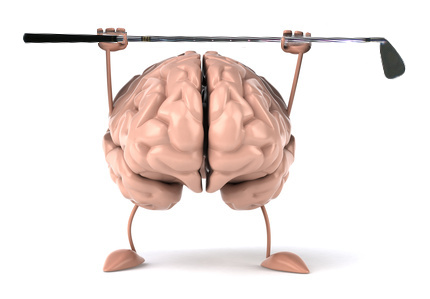Having the ability to play golf to the highest standard, is not only about the physical aspects of the game but also the mental aspects too. The following tips, will help to ensure that you have the mental edge when out on the golf course.
Set Goals
Setting goals can help to improve performance levels through increased motivation. Having a specific target to aim for during a round of golf, whether it be a final score or on a hole-to-hole basic, can also improve concentration levels. Having said that, a challenge is good but do not set goals that are too unrealistic, otherwise it can have the opposite effect.
Focus On Your Own Game
It can be very easy to get caught up in what other people are doing on the golf course. Regardless of the conditions you are playing, it could be a tournament or a round with friends, the principle remains the same. For example, if you are playing on a Sunday morning with friends and they all hit a good tee shot, before you step up for your own, do you worry, thinking that because they hit a good tee shot, it will be embarrassing if you do not? This is the wrong state of mind in which to approach the shot. You are in control of your own mind and thoughts and although it is easier said than done, your mind should be solely on your own shot and where you want it to go. Do not allow yourself to be distracted by what other people are doing on the course and keep your mind fully on your own game.
Stop Thinking About the Outcome and Concentrate on the Process
Linked to the previous tip, this one can help to control nerves, especially on the first tee. Every person likes to make the perfect start to a round of golf and it is easy to start feeling nerves when setting up that first tee shot. Whether it be a competition or just a round with friends, you can guarantee that there will be other people watching, which can pile on the pressure and increase nervousness. The key to avoiding this, is to concentrate on the process of the golf shot you are about to make and nothing else. By breaking down the elements of the swing and processing them through the mind, this can clear any nervous thoughts that were starting to develop and result in a much better shot.
Ignore Unwanted Advice
Always stick to the plan that you have set out. Following these processes over a period time, will help to improve your game but only if you do not deviate away from them. Do not allow friends or other people at the driving range or putting green, to stop you from following your plan. Although the advice will be well meant and they will think they are helping you, it will only be to the detriment of your own confidence in the long term.
Getting Over a Bad Shot
The key thing to remember here, is that you will always learn more from a bad shot, than you will from a good shot. Sure, no player wants to hit a bad shot but the reality is, it is going to happen, so why not use it as a way to improve your game, rather than a way to beat yourself up? Following a bad shot, hold your stance for five seconds and think about what it was you did and how you can improve on it next time. After that five seconds, the shot is no longer of any use to you. Get in to a routine for when you hit a bad shot. Many players have ways of acknowledging a good shot, such as a fist pump, so it’s a good idea to have a way of dealing with a bad shot, such as dusting your hands off. Mentally, by doing this, it’s as if you have shaken off any lingering memories of the shot and are ready to start, fresh, on the next one.






































